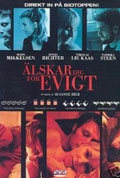
Directed by
Susanne Bier
113 minutes
Rated MA
Reviewed by
Bernard Hemingway

Open Hearts
Synopsis: Cecilie (Sonja Richter) and Joachim (Nikola Lie Kaas) are young, in love and soon to be married. Their lives intersect those of another, older, couple Marie (Paprika Steen) and Niels (Mads Mikkelsen), happily married with three children. Nothing will ever be the same.There’s scene in As Good As It Gets in which Jack Nicholson tells his travelling companions, Helen Hunt and Greg Kinnear, that lots of people have happy stories with boats and picnics and so on, just " no one in this car". The same applies to this film. It begins by setting the boats-and-picnic idyll then proceeds to tear it apart.
Open Hearts is a Dogme film which, if you know nothing about it, has a number of proscriptive requirements on the film-makers that essentially are about stripping back the production to make film more honest to life. A corollary to this is that subject-matter has the same integrity. This brings us to the general dilemma alluded to by Jack – that "life" only intrudes upon our consciousness in its tragic guise. This is particularly so in art. Who wants to read a book or see a film about fecklessly happy people breezing from one picnic to another? No, we want a bit of adultery, back-stabbing and breast-beating along the way and if a deus ex machina is required to spoil festivities, so be it.
The Dogme manifesto is about the art of cinema and hence content-wise is, almost of necessity, driven to a tragic perspective (this generally applies to other Dogme films, Festen, The Idiots, Breaking the Waves and Dancer In The Dark). I have no objection to this. But if you’re going to start it – finish it off. This film is remarkably fey in that respect. It requires that all four principals have their dreams shattered, and gives the bulk of screen time to depicting this. Yet it resolves their pain in more or less the same way for each - by resigned withdrawal. Acceptance may be a philosophical virtue in real life but in a narrative fiction (which this is), multiplied by four, it provides a monotonous and given what has gone before , bland denouement (this is particularly so in the case of the Marie character (played by Dogme stalwart Paprika Steen who is otherwise excellent), who goes from my-life-is-over histrionics to cake-baking in one cut). The principal strength of this film is in its writing but in its weak closure it loses considerable ground. A recent film which explored the same problem, Robert Guediguian's Marie-Jo and Her Two Lovers, for my money, was much more effective in resolving its emotional dilemmae.
Although its Sturm und Drang style has won Open Hearts (surely the worst film title for a long time) considerable critical praise, the background implication is that the Dogme approach to film-making is both becoming a style and returning to the fold of more conventional cinematic expectations.

Want more about this film?


Want something different?




